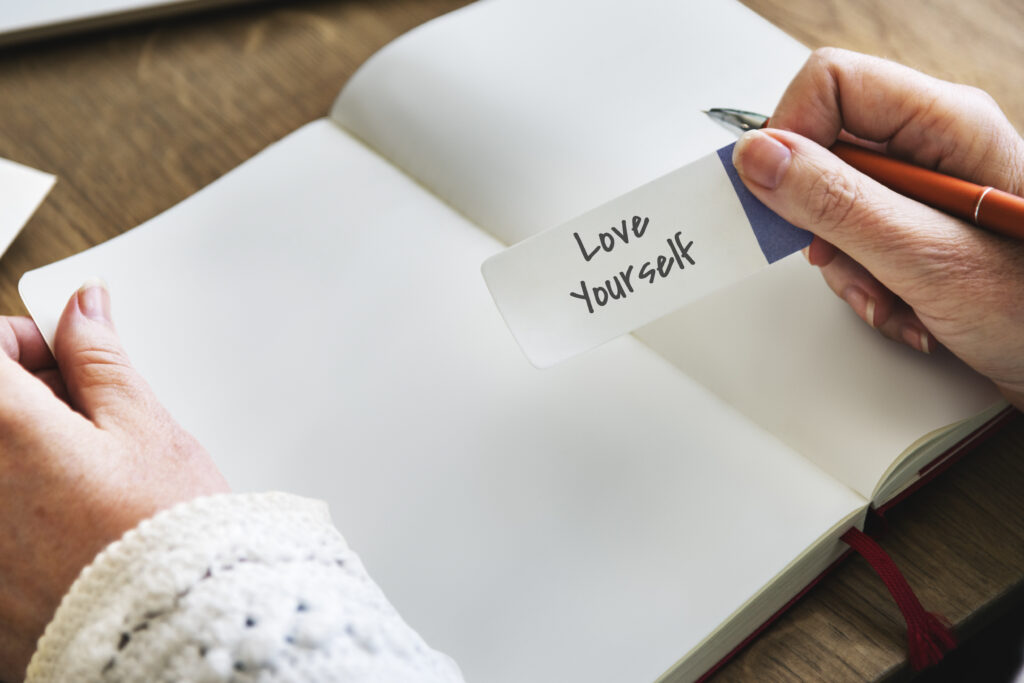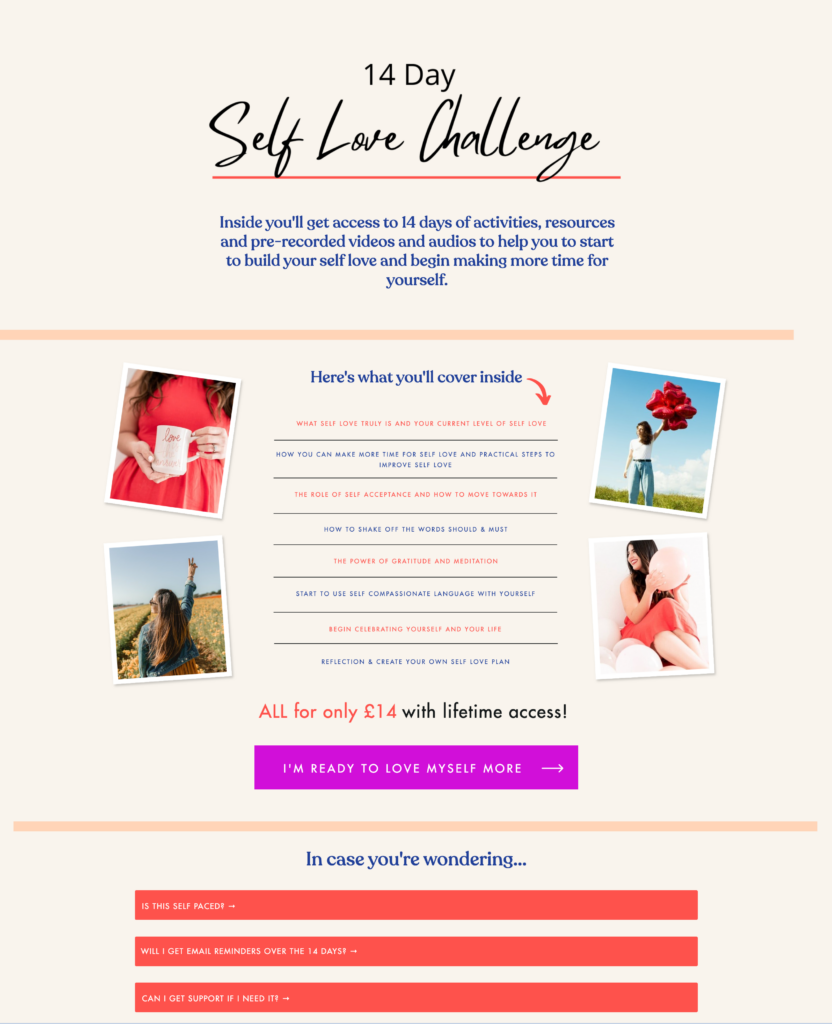When you have little to no confidence and your self-worth is shot to pieces, the concept of loving yourself can feel completely out of reach.
But as someone who has been there, I’m here to tell you that you CAN love yourself; you just need to know where to start.
From being able to spot the signs that you don’t love yourself, to reaping the benefits when you do: Let’s look at everything you need to know to boost your confidence, build self-esteem, and learn the life-changing beauty of self-love.
How can you love yourself?
It’s a question that so many of us struggle with when we’re going through a really hard time. We know, deep down, that we deserve so much more. We know we need to learn to love ourselves. After all, that’s what all the experts keep saying. But when you’re already low and stuck in a pattern of unhelping thinking, where do you start?
For all of us who are uniquely human (and that’s everyone on the planet), love is a basic human need. Together with shelter, food, and warmth, it’s one of the most important elements for survival.
But if you were stranded on a desert island (think Tom Hanks in Castaway), the only one available to give you the love is you!
While we also need love and approval from others to feel appreciated and wanted, it’s so important to recognise that love has to start from within. From the basics of looking after your personal needs (think; hygiene, eating, exercising, good sleep, etc), to going to a deeper level and celebrating all the great things about yourself, self-love is essential.

Self-love vs. Self-care
Self-love is intricately linked to self-care, but self-care is a small part of a much larger picture. We all talk about the importance of practising self-care, but what is it?
What is self-care?
Self-care is the ‘taking action’ part of self-love. It’s the practice of looking after your physical health, protecting your mental health, and making sure you make time for the things you enjoy doing. It’s setting boundaries and sticking to them for your own overall wellbeing.
What is self-love?
Self-love is the energy behind how you treat yourself. It’s the care and attention you give to yourself, how you talk to yourself, the level of kindness and compassion you extend to yourself, and much more.
For more tips on self-love and a round up of quotes you can use to help you, visit this post: Self-love phrases and tips: Learn to love yourself.
10 Signs You Don’t Love Yourself
When life feels like a constant negative cycle, we tend to focus on the bad things rather than the good things. Which means we’re not loving ourselves fully or in the way we deserve.
Here are some key signs that your self-love level is low (and we’ll look at how you can elevate it further down):
Negative thinking
How often do you berate yourself for not being thin enough, or for not having perfect skin, or think that no-one wants to be around you? These types of thoughts have a negative impact on your overall sense of well-being, because that voice inside your head is constantly putting you down. Instead, try telling yourself something nice next time you look in the mirror. Or write down all the things you are proud of about yourself and your life.
Apologising
Do you find yourself apologising constantly, particularly when you don’t need to? You feel like you need to say sorry all the time, automatically assuming you’re somehow to blame for anything that’s gone wrong.
Tolerating unhealthy relationships
When we don’t love ourselves, we believe we’re not worthy and accept the way we are treated as ‘normal’. We can get stuck in toxic and abusive relationships because we can’t imagine there being anything better, or believe we don’t deserve better than this.
Unable to say ‘no’
Those of us who often say ‘yes’ to everything do so because we don’t want to cause conflict. When you’re not used to it, saying ‘no’ can be scary. By saying ‘no’, there’s the fear that the person will get angry, or worse, reject us. So we keep being available to everyone for everything, which affects our overall confidence and sense of worth.
Having no boundaries
Having no boundaries can be really detrimental to our mental wellbeing, leaving us feeling exposed and overwhelmed. Boundaries can include things like asserting when you need some time alone, or letting people know if you’re not comfortable with something. Or simply, being confident enough to say ‘no’.
Avoiding social interaction
When you’re feeling low and struggling with self-esteem, social interaction is often the last thing you feel like doing. It’s often easier to hide away, but doing so can contribute to feelings of loneliness and depression.
Fear of failure
While fear is a natural and normal emotion, it can also stop us from pushing ourselves out of our comfort zones, keeping us stuck. If your self-esteem is low and you don’t believe you are capable of anything, you won’t try.
Neglecting personal needs
Most of us have days where we can’t be bothered to get dressed, groom ourselves, or eat healthily. But when it becomes an everyday problem, it’s a sure sign you’re not giving yourself the love and attention you ultimately need.
Self-sabotaging
You know when you really want to do something, and have a plan to get there, but then find you’re putting obstacles in your own way? Your brain likes to come up with excuses to keep you firmly in your comfort zone, and you continue to believe that you just can’t do it/you’re not worth it/everyone else is better than you. That, my friends, is self-sabotaging.
Comparisonitis
As mentioned above, it’s so easy to think that everyone else is better than you. Enter: Comparisonitis.
“Comparison is the thief of joy!” – Theodore Roosevelt
Comparing ourselves to others (particularly where social media portrays such a convincing picture of a perfect life) is an excellent way to instil those beliefs of self-doubt. However, when you love yourself, you learn to appreciate everything that is in your life, without judging or pining after someone else’s ideal.

The Benefits of Self-Love
Learning how to love yourself can literally improve your entire life. As mentioned in our post on Self-Love Phrases, when you give yourself the love you deserve, that love shines from within and attracts all sorts of lovely things into your life. Here are a few benefits worth thinking about:
Lower stress and anxiety
When life is good, it feels easier. It flows better, and we can handle stress in our stride. When you give yourself the love you need, you adopt a more positive outlook. You know when you’re in the throes of a new relationship, and you feel on top of the world, and nothing phases you? You can get the same feeling through self-love. Plus, it’s a deeper, unconditional love.
A strong sense of faith in yourself
Loving yourself means having faith in your abilities. Your confidence grows, and you feel able to accomplish anything. With loving yourself, comes trusting yourself. And while some things may still make you nervous, you feel capable and competent.
Confidence in setting boundaries
Remember those personal boundaries we talked about earlier? When you have a healthy level of self-love, you know yourself, what you need/want, and feel confident in asserting those needs. You can also begin to feel confident in saying no, which can be incredibly empowering. Amazing, right?
A keenness to try new things
Confidence and higher esteem in yourself and your abilities brings the courage to try something new. Where you might previously have felt terrified at the prospect of joining a new fitness class, you’ll start to feel that you might just be able to give it a try. And who knows where that may lead? Increased vitality? New friendships? Action breeds confidence, so the only way is up.
Increased empathy for others
When you understand yourself and are able to love and give yourself the kindness and compassion you need, you begin to understand what others may be going through. More love for yourself means more love for everyone else, along with the ability to show empathy and support. Increasing love all round, so it’s a win/win.
Feelings of empowerment
All of these benefits compound in the wake of loving ourselves. The increased confidence, better mental health, and a connectedness to others reinforces those feelings of worth that make us feel good. Being able to assert our needs and recognise that we are just as important as anyone else brings a sense of empowerment like no other, and you begin to feel like you can do anything.
So, where shall we start?
How to Love Yourself: 20 Steps to Build Self-Esteem and Confidence
Here are 20 steps you can take to learn how you can love yourself right now:

1. Develop self-awareness
Being self-aware means understanding yourself. Knowing what you do and don’t like, what your beliefs and values are, and what makes you behave in a certain way. Remember, you don’t have to be like everyone else — we’re all unique. That’s what makes us so interesting! And having an awareness of all of your qualities, traits, and quirks, is the first step to accepting yourself at your core.
2. Start a journal
If you don’t understand who you are right now, that’s OK. A great way to help with this is to keep a journal. Writing about your feelings — or even day-to-day stuff — can help to provide a lot of insight into who you are as a person.
It’s actually a great form of therapy, because the more you write, the more your inner thoughts emerge onto the paper. It can create a lot of ‘aha!’ moments, and help you to recognise your needs and where you might need to set those boundaries we spoke about earlier.
3. Learn self-compassion and kindness
I know we’ve touched on this above, but being kind to yourself is one of the best ways to love yourself. Treat yourself the same way you would treat someone you care for deeply. Where the love is unconditional and you forgive their faults.
If you make a mistake, don’t berate yourself for it. Acknowledge it, but remember that everything is a learning process. We never stop learning, and we all make mistakes. It’s what makes us human.
4. Meditation
Alongside journaling, meditation is another great practical method of self-love. It doesn’t have to involve sitting cross-legged on the floor for hours at a time, either! Meditation is simply a case of being aware, and tuning into the present moment.
It helps to calm you down and steady your breathing, and allows you to really listen to your inner thoughts and feelings. You can meditate sitting down, lying down, or while out for a walk or a run. Even relaxing activities like painting or crafting are a form of meditation. It’s about making a conscious effort to be present and focused on what you’re doing right now.
5. Accept compliments gracefully
How many times do you say ‘oh, this old thing?’ when someone says they like your outfit? It’s like we’re pre-programmed to reject any compliments, because deep down, we believe that we don’t deserve it.
Learning to accept compliments gracefully can help instil the message that you are indeed worthy, so make a habit of soaking up that praise and saying ‘thank you’ the next time someone says something nice. Because you are worth it.
6. Avoid comparisonitis
I know it’s hard, but try to make a conscious effort to avoid comparing your image, life, or your progress, to everyone else. If necessary, take a break from social media and concentrate on all the good things you have in your life, rather than the things you are lacking. Practising gratitude can really help with this.
7. Surround yourself with positive people
Have you ever heard the phrase: “You’re the sum of the 5 people you spend the most time with”? Spoken by the late motivational speaker Jim Rohn, what he means is that your habits and behaviour mimic that of the people in your life.
If the majority of the people in your life are stuck in a downward spiral of negativity, it’s going to rub off on you. Instead, surround yourself with people who always see the bright side, love to celebrate the good times, and don’t get bogged down by doom and gloom.
8. Log your achievements
Struggling to get into a positive frame of mind? A great way to overcome this is to write a list of all of your achievements. When you see everything that you’ve accomplished so far, you begin to see yourself in a new light and realise that you’re capable of a lot more than you previously imagined.
9. Challenge unhelpful thinking patterns
Unhelpful thinking patterns, or negative thought patterns, can really keep us stuck. But, did you know that it is possible to change your thoughts? It involves becoming aware of thoughts as they enter your mind. Most of the time we’re not actively conscious of them, which is why our minds run the show in the background.
While our brains are preprogrammed to keep us safe (going back to caveman times when there were real dangers), it doesn’t help in this day and age where the threats aren’t quite as real as big scary predators. This running commentary of ‘safe’ negative self-talk can make us feel anxious.
E.g. “Don’t wear that outfit, you’ll be laughed at”, “Don’t go to that party; no-one will talk to you”.
I have a really helpful resource that you can use for free to help with this, including questions and journal prompts to help you.
Download the Unhelpful Thinking Habits PDF here.
10 . Create positive habits
Maintaining good habits can make a world of difference to your life. For example, prioritising sleep and rest, eating a balanced diet, and making time for exercise. Incorporating any positive habits into your day can make a lasting impact on how you feel about yourself.
Here are some positive habits you can start now: 5 Daily Habits to Boost Your Self-Esteem.
11. Let go of the past
Holding onto the past stops us from moving forward and being happy. But to be happy, we need to live in the present. Letting go of past grievances means allowing yourself to enjoy the here and how.
Enjoying your life today is the perfect way to love yourself. If you are struggling with things that have happened in the past, it’s worth finding someone to help you work through it.
12. Learn self-acceptance
We’re all born into this world with our own personalities, which are further shaped as we grow. Everything that has happened to you in your life, including your beliefs and values, are what makes you, you. You don’t need to be the same as everyone else. If there’s something you don’t like about yourself, you can change it.
But learning self-acceptance is the first step to anything.
You need to be able to accept who you are and embrace your flaws before making any decisions to change something. As you develop your skills in loving yourself, you might decide you’re quite proud of your quirky sense of humour. And there are people out there who will love that about you, too.
13. Write your own affirmations
Affirmations are an excellent way of training your brain to reverse the negative thinking patterns. For example, if you are always berating yourself for not being good enough, an appropriate affirmation for you would be:
“I am enough.”
Have you tried it before and found it doesn’t really help? Don’t worry, because there is a way to get around this. Here’s why affirmations might not be working for you.
14. Love your body
The media bombards us with images of ‘perfect’ bodies, immaculately made-up faces, and skinny figures bedecked in ‘beautiful’ clothes. With these images, it can be really hard not to criticise our own bodies against these ‘ideals’.
But your body is unique to you.
And you are perfect, just as you are.
You are the way you are because of your genetics and the life you live. So learn to love your scarred tummy that carried your children. Look after your feet that you previously considered ‘too wide’.
It’s only your opinion that matters.
Nature built you the way you are, and it’s up to you to cherish yourself. With practice, you can learn to embrace your flaws.
15. Make time for fun
When it comes to self-love and practising self-care, there’s something that many of us neglect to do. Which is to make time for fun — for all those things you use to love doing when you were younger. When was the last time you enjoyed spending time on your hobbies?
I don’t just mean taking time to keep fit (even if exercise is one of your hobbies), but what about other pastimes? Are you into photography? Birdwatching? Gardening? Crafts? Climbing? It’s so important to make time for the things that bring us joy, to help create a healthy balance of vocation and fun. After all, we’re here to enjoy ourselves!
16. Celebrate your uniqueness
Earlier, I mentioned how we’re all uniquely human — it’s what makes us all special. The world would be boring if we were all the same, and you were made to be exactly who you are. So, start celebrating the true you. Your personality, your likes, your dislikes. Be proud of who you are and remember that there’s only one of you, which is as it should be.
17. Set personal boundaries
Remember those boundaries we spoke about above? Setting personal boundaries is really empowering as it is an affirmation of your own self-acceptance, self-worth, and self-love. By setting boundaries, you send the message to yourself and to others that you value yourself and are just as deserving as everyone else.
Take a look at our post on How to Set Boundaries for Wellbeing for more support with this.
18. Smile more
When we smile, it releases endorphins (happy hormones!), instantly boosts mood, and can help us feel much less stressed. It also has an impact on your relationships with others. Plus, smiling makes you appear more approachable to others, which can ultimately boost your social interactions. So you get those feel-good feelings all round.
19. Try laughter yoga
If you’ve never heard of laughter yoga, you’re in for a treat. It’s a great way to instantly lift your mood, and all you need to do is laugh! While it is technically an exercise programme and an actual form of yoga, you can try it anywhere.
Even forcing a fake laugh can instantly boost your mood. We all know that laughter can be contagious – the more you do it, the funnier it gets, and the more you laugh.
Laughter can strengthen your immune system, reduce pain, and relieve stress.
Have a search for yoga classes near you, or just try a few belly laughs to get you started.
20. Create a self-love plan
Hopefully, you’ve got some great ideas on how to move forward in embracing self-love, which is necessary for your physical and mental health.
It absolutely is possible to learn how to love yourself, but sometimes, it can be difficult to know where to start.
I know, because I’ve been there.
That’s why I’ve created this 14-day self-love mini-course for you, to give you the support you need to start loving yourself.
You’ll have me by your side every day through a series of pre-recorded videos and audios, with lifetime access, for just £14.
Here’s what we’ll focus on:
When you really start to love yourself, you’ll see amazing changes in yourself and your life.
So, let’s build your self-love and make you a priority, because you absolutely deserve it.
Click the button below to get access to your 14-day self-love challenge, with lifetime access, for just £14.

Hey I’m Natalie, Supporting women like you on their road to self-acceptance and building a positive body image.


View comments
+ Leave a comment